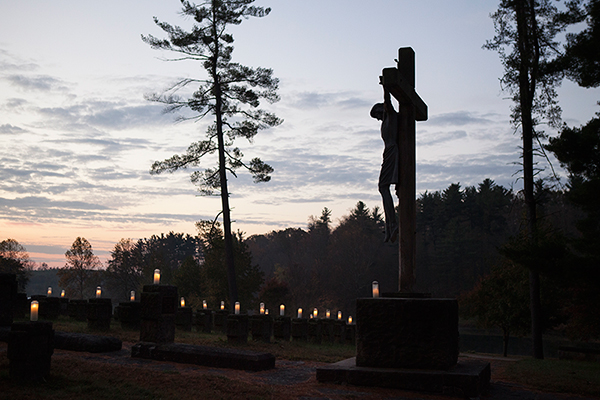Witness to the Goal of Life
Fr. Adrian Burke, OSB
Thursday, September 19, 2019

"It is written: 'Distribution was made to each one as he had need.'"
Rule of St. Benedict 34.1
Since coming to Saint Meinrad in 1990 to study for the priesthood, I've learned a lot of new vocabulary!
Words are important, and certain words are key to understanding the good news of Jesus Christ - his Gospel.
One of the critical new words I learned was eschatological - the ch pronounced like a k – a word that means “pertaining to the end times.” This isn’t a word I’d ever heard before, and even now it’s not a word I would typically use in a homily at a parish. It is nonetheless an important word for Benedictines because it points to the heart of what it means to be monastic.
In a previous reflection on our Benedictine values, I wrote that we are called by Christ through his Gospel to a new way of being human. Our monastic life is to be an “eschatological witness” to a newly fashioned humanity that, in the end, will be raised up to enjoy an eternal fulfillment. This is what God intended for humanity from the beginning.
We make our way in that direction by following Christ who is the way (John 14:6). Following him means imitating what he did by the grace of the indwelling Holy Spirit: loving and receiving others, forgiving and being merciful, identifying with the “least,” those most vulnerable in our society, and standing with them in their suffering and against injustice in all its forms.
But to do what Christ did without God’s assistance is just not possible – we are often too afraid or insecure, driven by our own natural instincts for self-preservation, an attitude that can make us competitive toward others and even spark violence. In that fearful mode of living, "loving our enemies" is practically unthinkable, to say nothing of “turning the other cheek” or “praying for those who persecute you” (Mt. 5:44).
Grace, which is God’s assistance given us by the Holy Spirit, helps us to do what Christ commands, which is nothing other than what Jesus did as recounted in the gospels. Imitating Christ is really what the spiritual life of the Christian is, which entails the whole of life, not just its explicitly religious aspects.
So the life of the Benedictine is to be, above all, an imitation of Christ, specifically for the monk, in the mode (here’s that word again) of an eschatological witness to the end, or goal, of life as intended by God – which is the kingdom of heaven.
The indwelling Holy Spirit helps us to hold firm to the gospel "in the faith and love that are in Christ Jesus" (2 Tim 1:13). Jesus learned to trust that all he needed would be provided by his loving God, whom he called “Father,” so we must strive to participate, so to speak, in Christ’s faith – the faith of Jesus. Christ has made available to us his own mind and thinking, his ways of seeing and doing things (1 Cor 2:16) – so in Christ we have access to all we need to be all God wants us to be.
Jesus’ faith in the Father was emulated by the ancient church in Jerusalem as described in the Acts of the Apostles. But even if today’s church institutions and religious communities have become far more complex than the early church ever could have imagined, we still hold firm to the same principle of faith and learn to rely on God for all we need, because such reliance is the key to our redemption as God’s holy people.
In time, this can come more “naturally” to one who loves Christ above all and has " put on Christ" as a new way of being human (RB 4:74; Rom 13:14) – " dead to sin and alive to God in Christ Jesus" (Rom 6:11) – this is what being an “eschatological witness” is all about.